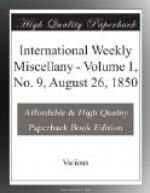* * * * *
[FROM THE SPIRIT OF THE TIMES]
REMINISCENCES OF SARGENT S. PRENTISS, OF MISSISSIPPI.
BY T.B. THORPE.
AUTHOR OF “TOM OWEN, THE BEE HUNTER.”
The death of Sargeant S. Prentiss has called forth an universal feeling of sorrow; the consciousness that “a great man has fallen” is depicted upon the faces of the multitude.
The eloquent offerings to his virtues and to his genius that everywhere follow the news of his demise, are but slight tokens of that sorrow that fills the heart of all who knew the gifted Prentiss. Having known him long, and having had frequent occasions to witness exhibitions of his great mental powers, I cannot refrain from paying an imperfect tribute to his memory.
I first met Mr. Prentiss when he was in the full maturity of his power, but I have the pleasure of knowing hundreds who were well acquainted with his early history and early triumphs. Volumes of interest might be written upon the life of Mr. Prentiss. And then his high sense of honor, his brave spirit, his nobleness of soul, his intense but commendable pride, his classical attainments, and his deep knowledge of the law, can scarcely be illustrated, so universal and superior were his accomplishments and acquirements.
In his early career, I consider Mr. Prentiss both fortunate and unfortunate. I have often imagined the shrinking but proud boy, living unnoticed and unknown among the wealthiest citizens of the south. Buried in the obscurity of his humble school, he looked out upon the busy world, and measured the mighty capacities of his own soul with those whom society had placed above him. I think I see him brooding over his position, and longing to be free, as the suffocating man longs for the boundless air of heaven. His hour of triumph came, and surpassed, perhaps, his own aspirations. From the schoolroom he entered that of the court—a chance offered—a position gained—the law his theme, he at once not only equaled, but soared even beyond the aim of the most favored of his compeers.
The era was one of extravagance. The virgin soil of Mississippi was pouring into the laps of her generous sons untold abundance. There were thousands of her citizens, full of health and talent, who adorned excesses of living by the tasteful procurements of wealth, and the highest accomplishments of mind. Into this world Prentiss entered, heralded by naught save his own genius. The heirs of princely fortunes, the descendants of heroes, men of power and place, of family pride, of national associations, were not more proud, more gallant, than was Prentiss, for “he was reckoned among the noblest Romans of them all.”
Each step in his new fortune seemed only to elicit new qualities for admiration. At the forum he dazzled—the jury and the judge were confounded—the crowd carried him to the stump, and the multitude listened as to one inspired. Fair ladies vied with each other in waving tiny hands in token of admiration—the stolid judges of the Supreme Court wondered at the mind of the apparent boy—even the walls of Congress echoed forth paeans to his praise. His course was as rapid and brilliant as that of the meteor that suddenly springs athwart the heavens, but he was human and accomplished his task, herculean as he was, at the price of an injured constitution.




